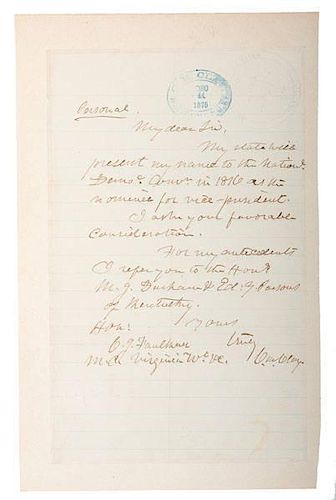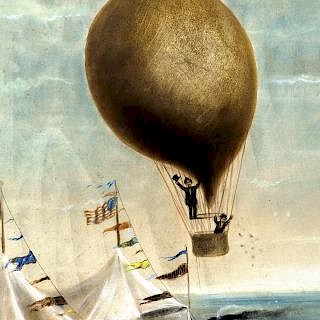Cassius Marcellus Clay, ALS Announcing Himself as Vice Presidential Nominee, 1876
About Seller
6270 Este Ave.
Cincinnati , OH 45232
United States
With offices in Cincinnati, Cleveland and Denver, Cowan’s holds over 40 auctions each year, with annual sales exceeding $16M. We reach buyers around the globe, and take pride in our reputation for integrity, customer service and great results. A full-service house, Cowan’s Auctions specializes in Am...Read more
Two ways to bid:
- Leave a max absentee bid and the platform will bid on your behalf up to your maximum bid during the live auction.
- Bid live during the auction and your bids will be submitted real-time to the auctioneer.
Bid Increments
| Price | Bid Increment |
|---|---|
| $0 | $25 |
| $500 | $50 |
| $1,000 | $100 |
| $2,000 | $250 |
| $5,000 | $500 |
| $10,000 | $1,000 |
| $20,000 | $2,500 |
| $50,000 | $5,000 |
| $100,000 | $10,000 |
About Auction
Jun 13, 2014 - Jun 14, 2014
Cowan's Auctions dawnie@cowans.com
- Lot Description
ANS, 1p (4.5 x 7.5, professionally mounted on larger sheet 5.5 x 8.75 in.), "Whitehall" (Richmond), KY, Dec. 11, 1875. In a note to Charles J. Faulkner (MC WV), Clay states: My state will present my name to the Nationl. Democ. Convn. in 1876 as the nominee for vice-president. I ask your favorable consideration. Stamped at top with "C.M. Clay / Whitehall P.O. KY," with date in center of oval.
Cassius Marcellus Clay (1810-1903) was a member of the prestigious Clay family of central Kentucky. Born in Madison County near Richmond, he was the younger son of Green Clay and Sally Lewis. His older brother, Brutus Junius, was also a politician at both state and federal levels. The brothers were second cousins to Henry Clay.
Even though the Clay family were prosperous landowners, planters, and (at the time, almost by definition) slaveholders, during his time at Yale he heard William Lloyd Garrison speak and became an abolitionist (although some have described him as a racist abolitionist). Clay served in the Kentucky House of Representatives, but lost support as his abolitionist views became more zealous. There were assassination attempts even before he established his anti-slavery newspaper, True American, in Lexington, KY, after which the death threats intensified. (He established a printing office in Cincinnati, OH, just across the river, which had become a center of abolition activity in the Midwest, after his printing office was broken into by a mob of pro-slavery advocates.)
Clay became an associate (friend?) of Abraham Lincoln and founder of the Republican Party in Kentucky. He also was the organizer of an impromptu militia band in Washington whose primary purpose was to protect the President and the city in early April and May 1861, after war was declared until sufficient numbers of Union troops arrived to protect the capital. Reportedly the image presented by Clay, with three pistols in his belt and a sword hanging at his side caused John Hay, Lincoln's secretary, to struggle not to laugh out loud. Clay was pompous, cocky and pugnacious, and apparently cut quite a figure in Washington.
Clay's bid to Lincoln for the position of Secretary of War was rejected. He refused the position as Minister to Spain and the Senate rejected him for England or France. Finally Lincoln appointed him Minister to Russia, and he is credited with keeping Russia allied to the Union.
However, as the war dragged on, Clay wanted to return to fight. Lincoln was not sure what to do with him, in part because of the position posed by Kentucky as a border state. And Lincoln described Clay as having "a great deal of conceit and very little sense," and not fit for a command. However, Lincoln appointed him Maj. General, hoping the war would be over before Clay returned home. When it wasn't, and Clay did not receive a high-level command in which he was in control, he wanted to return to Russia. He did remain there until 1869.
In 1872 Clay broke with the Republican Party. He apparently suffered mental illness as he aged, making one wonder about his state when he penned this note (although it does fit with Clay's ego and brazenness). He also lost most of his political agenda when slavery ended, being pretty much a single-issue politician. Clay was not nominated; only Thomas Hendricks (IN) was named and nearly unanimously selected to run with Samuel Tilden.
In 1878 Clay divorced Mary Jane, his wife of 45 years (1833-1878). Besides his mental state, the long absence in Russia appears to have strained the marriage. Some years later, at the age of 84, Clay married 15-year-old Dora Richardson, but the marriage ended in a short time (1893-1897). When he died at home in 1903 at the age of 92, he had nearly exhausted what had been a substantial family fortune on failed business ventures, including his paper. The home was purchased at auction by a grandson and rented to tenant farmers for half a century. When it was abandoned and heavily damaged by vandalism, it was donated to the State of Kentucky. The mansion was restored and is now a part of the state park system.Excellent, other than being mounted on the larger sheet.Condition
- Shipping Info
-
SHIPPING. At the request of the buyer, Cowan's will authorize the shipment of purchased items. Shipments usually occur within two weeks after payment has been received. Shipment is generally made via UPS Ground service. Unless buyer gives special instructions, the shipping method shall be at the sole discretion of Cowan's Auctions, Inc.. Cowan's is in no way responsible for the acts or omissions of independent handlers, packers or shippers of purchased items or for any loss, damage or delay from the packing or shipping of any property.
-
- Buyer's Premium



 EUR
EUR CAD
CAD AUD
AUD GBP
GBP MXN
MXN HKD
HKD CNY
CNY MYR
MYR SEK
SEK SGD
SGD CHF
CHF THB
THB



